Warning: This article contains information about child abuse which may be distressing for some readers.
1. “Why don’t we ever see the kids?”: Neighbours speak after 13 siblings were found shackled and starving in a California home.

The 13 California siblings who police say were starved and chained to beds by their parents rarely left their dishevelled house and, when they did, appeared small and pale and acted strangely, neighbours say.
David Allen Turpin, 57, and Louise Anna Turpin, 49, were arrested on Sunday and each charged with nine counts of torture and 10 counts of child endangerment. It came after a 17-year-old, emaciated girl escaped the house in Perris, east of Los Angeles and called police, said the Riverside County Sheriff's Office on Monday.



